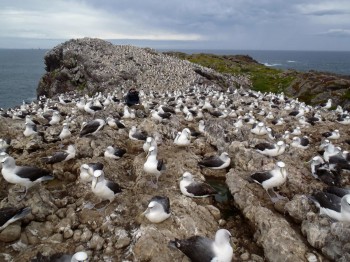Katherine Keogan (Institute of Evolutionary Biology, University of Edinburgh, UK) and a suite of colleagues have published a study of no less than 62 seabird species in the journal Nature Climate Change that shows that breeding seasons have not altered in relation to sea temperature rise.
The paper’s abstract follows:
“Reproductive timing in many taxa plays a key role in determining breeding productivity1, and is often sensitive to climatic conditions2. Current climate change may alter the timing of breeding at different rates across trophic levels, potentially resulting in temporal mismatch between the resource requirements of predators and their prey3. This is of particular concern for higher-trophic-level organisms, whose longer generation times confer a lower rate of evolutionary rescue than primary producers or consumers4. However, the disconnection between studies of ecological change in marine systems makes it difficult to detect general changes in the timing of reproduction5. Here, we use a comprehensive meta-analysis of 209 phenological time series from 145 breeding populations to show that, on average, seabird populations worldwide have not adjusted their breeding seasons over time (−0.020 days yr−1) or in response to sea surface temperature (SST) (−0.272 days °C−1) between 1952 and 2015. However, marked between-year variation in timing observed in resident species and some Pelecaniformes and Suliformes (cormorants, gannets and boobies) may imply that timing, in some cases, is affected by unmeasured environmental conditions. This limited temperature-mediated plasticity of reproductive timing in seabirds potentially makes these top predators highly vulnerable to future mismatch with lower-trophic-level resources.”

An albatross breeding colony, photograph by Rachael Alderman
For popular accounts of the publication click here and here.
With thanks to Susan Mvungi and Richard Phillips.
Reference:
Keogan, K., Daunt, F., Wanless, S., Phillips, R.A. et al. 2018. Global phenological insensitivity to shifting ocean temperatures among seabirds. Nature Climate Change 8: 313-318.
John Cooper, ACAP Information Officer, 10 April 2018

 English
English  Français
Français  Español
Español